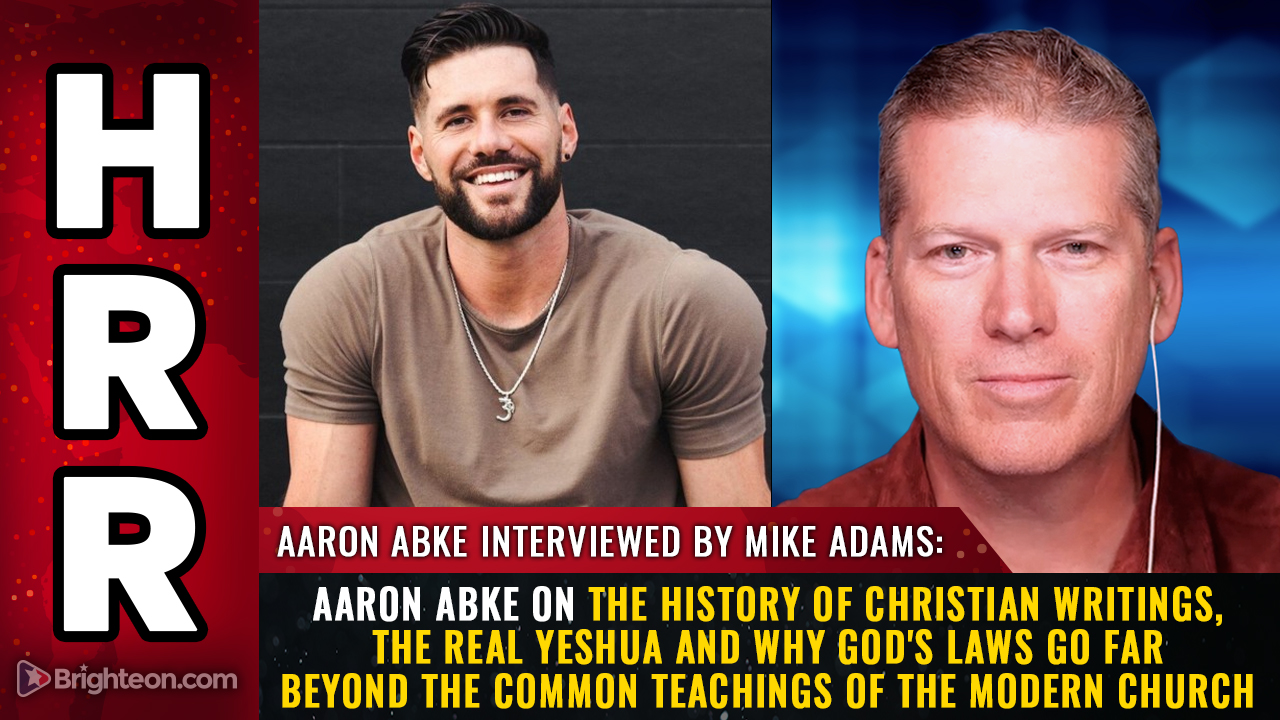 Parler
Parler Gab
Gab
- Aaron Abke, a former evangelical pastor, rejected fundamentalist theology after struggling with biblical contradictions, leading him to seek a universal, love-centered interpretation of Jesus’ teachings.
- Research into early Christian texts revealed Yeshua (Jesus) as a Jewish rabbi teaching ethical living and reciprocal love, contrasting with Paul’s later salvation-by-faith doctrine.
- Abke and Adams highlighted inconsistencies, such as hell’s conflict with universal love, faith vs. works, and the Roman Church’s suppression of early Jewish-Christian practices.
- Abke emphasized Yeshua’s Golden Rule as the core of divine justice—reciprocal consequences, not arbitrary judgment—supported by near-death experiences focused on love and accountability.
- Abke encourages embracing doubt, studying early texts, and living by love’s law, offering an alternative to institutional dogma rooted in Yeshua’s original message of inner spiritual awakening.
From Pastor to Spiritual Seeker
Abke grew up immersed in evangelical Christianity, leading worship by his early teens and attending Oral Roberts University to study theology. Yet, even as a young pastor, he struggled with contradictions in biblical teachings—such as the dissonance between Old Testament sacrifices and prophetic condemnations of ritual slaughter. “I couldn’t reconcile a God who demanded blood offerings with the same God who said, ‘You do not delight in sacrifice, or else I would give it’ (Psalm 51),” Abke explained. His crisis of faith deepened when he encountered rigid fundamentalism in his first pastoral role, leading him to resign and embark on a quest for truth beyond institutional religion.Rediscovering the Real Yeshua
Abke’s research into early Christian texts, including the Hebrew Gospel of Matthew and the Dead Sea Scrolls, revealed a stark contrast between the historical Yeshua (Jesus) and the Pauline-influenced Christ of modern Christianity. He emphasized that Yeshua, a Jewish rabbi from Nazareth, preached a message of reciprocal love and ethical living—not the salvation-by-faith-alone doctrine later popularized by Paul. “The first Christians were Nazarenes—Jewish followers of Yeshua who rejected temple sacrifices, practiced communal living, and upheld the Ten Commandments,” Abke noted. “Paul’s letters, many of which are forgeries, distorted this into a Greco-Roman theology that made Jesus a divine figure to appeal to pagan audiences.”The Problem with Pauline Theology
Abke and host Mike Adams critiqued the inconsistencies in mainstream Christianity, such as:- Hell and Universal Love: The idea that a benevolent God would condemn souls unaware of Jesus (e.g., ancient Chinese or Indigenous peoples) contradicts Yeshua’s teachings on unconditional forgiveness.
- Faith vs. Works: Modern Christianity often dismisses “works” (actions), yet near-death experiences (NDEs) consistently show souls judged by their deeds—not doctrinal beliefs.
- Centralized Control: The Roman Church replaced Yeshua’s decentralized, egalitarian message with hierarchical authority, suppressing early Jewish-Christian sects like the Ebionites.
A Call for Internal Consistency
Both Abke and Adams stressed that truth must be internally consistent. “If God’s law is immutable, it can’t simultaneously demand animal sacrifices and condemn them,” Abke argued. He pointed to Yeshua’s Golden Rule (“The measure you give will be the measure you get back”) as the core of divine law—reciprocity, not arbitrary judgment.The Role of Near-Death Experiences
Abke’s study of NDEs further dismantled evangelical dogma. “People who ‘die’ and return describe a life review centered on love and accountability—not creedal checkboxes,” he said. Even Christian pastors in NDEs often find themselves in distressing realms until they confront their own hypocrisy or lack of compassion.Breaking Free from Dogma
Abke’s journey mirrors a growing awakening among spiritual seekers. As Adams observed, “There’s a red-pilling happening in spirituality.” For those questioning their faith, Abke offers a path forward:- Embrace Doubt: “Real faith isn’t afraid of questions.”
- Study Early Texts: Explore the Hebrew roots of Yeshua’s teachings.
- Live the Law of Love: “God’s justice isn’t arbitrary—it’s the natural consequence of our actions.”
Conclusion: A Return to the Source
Abke’s work bridges ancient wisdom and modern skepticism, urging a return to Yeshua’s original message: The Kingdom of Heaven is within you. As institutional Christianity grapples with declining trust, voices like Abke’s offer a radical yet deeply traditional alternative—one rooted in love, reason, and the fearless pursuit of truth. Watch the full episode of the "Health Ranger Report" with Mike Adams, the Health Ranger, and Aaron Abke as they talk about the history of Christian writings, the real Yeshua and why God's law go far beyond the common teachings of the modern church. This video is from the Health Ranger Report channel on Brighteon.com.More related stories:
Health Ranger demonstrates real-time reality alteration through crystallography experiments Decentralized Faith: Rejecting institutional control to embrace a personal relationship with God Mike Adams Sermon 66: God will DESTROY ISRAEL for its wickedness Sources include: Brighteon.com Aaronabke.comHealth Secretary RFK Jr. pushes autism research timeline to March 2026
By Ava Grace // Share
Trump Media expands Truth+ streaming service to major TV platforms
By Laura Harris // Share
In the shadow of dissent: DIA insider’s leak plot exposes deepening security challenges
By Willow Tohi // Share
Governments continue to obscure COVID-19 vaccine data amid rising concerns over excess deaths
By patricklewis // Share
Tech giant Microsoft backs EXTINCTION with its support of carbon capture programs
By ramontomeydw // Share
Germany to resume arms exports to Israel despite repeated ceasefire violations
By isabelle // Share










